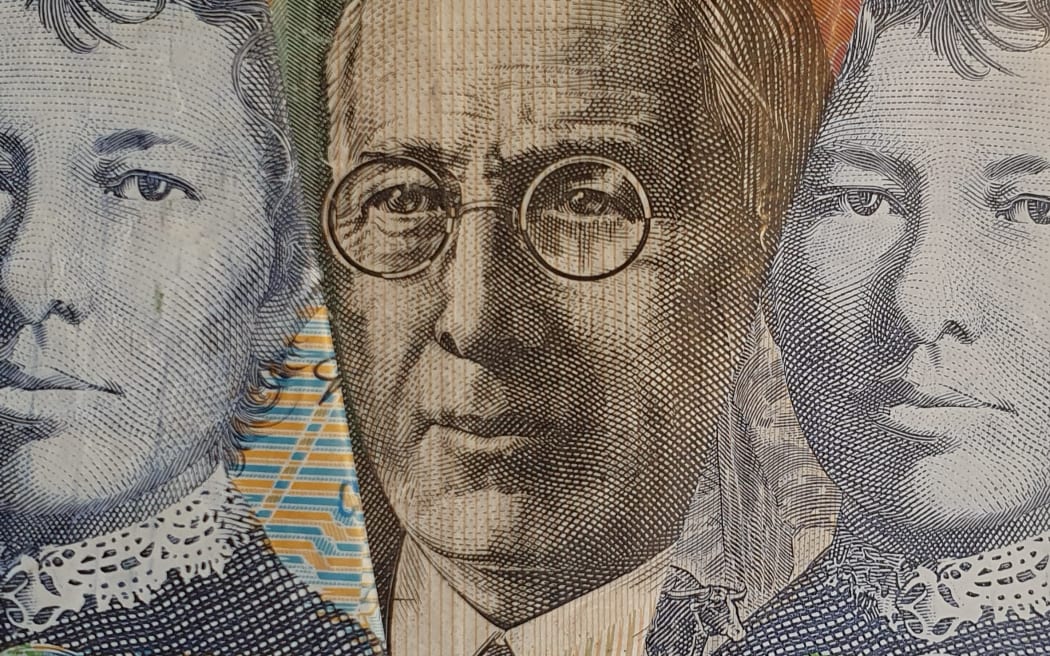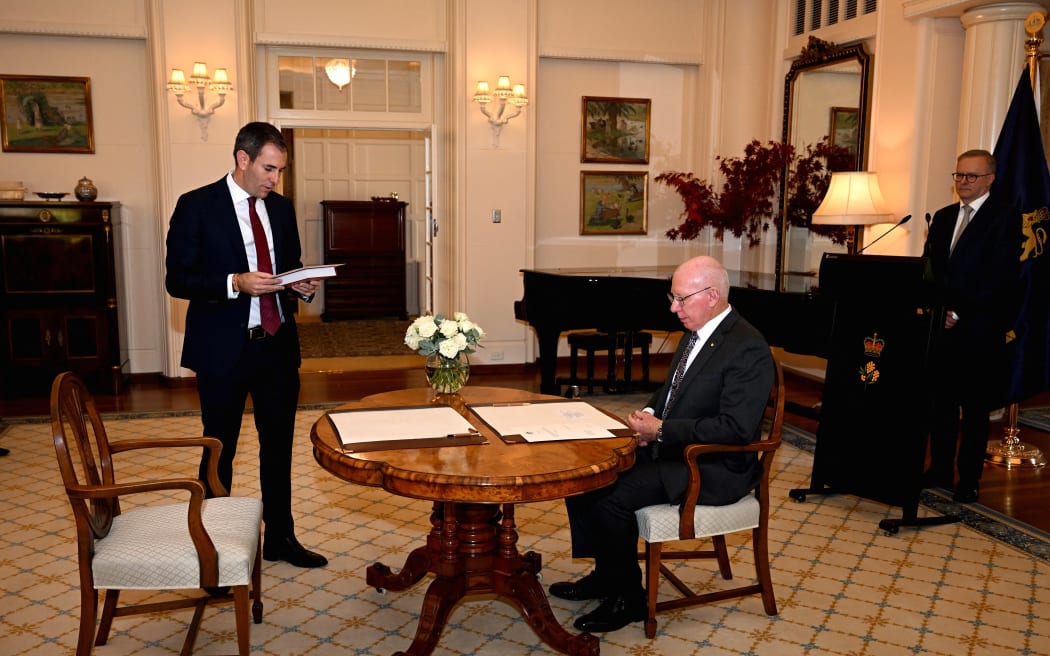Australia taking notes on New Zealand wellbeing budgets

Could attempts to make New Zealand's national budget more widely focused on wellbeing influence economic policy in Australia? Photo: 123rf
Australia's Budget, to be released on Tuesday will have a "wellbeing" section, modelled on the New Zealand budget concepts.
New Australian Treasurer Jim Chalmers said his country should start to measure wellbeing in other ways than the usual economic statistics, such as measuring the state of the environment or access to childcare.
He said he'd had extensive talks with New Zealand Finance Minister and Deputy Prime Minister Grant Robertson on how Aotearoa's wellbeing budget worked.
Wide interest in wellbeing components to national budgets
When Grant Robertson meets his counterparts at global events he has regularly been asked about wellbeing.
Not his own wellbeing, but the wellbeing of his entire country.
"I suspect it is in the talking points," he laughed, during an interview with the ABC.
"There is a real interest in it."
Among economists and those who study public policy, he has become known for handing down a "wellbeing" budget in 2019, declaring the success of the economy under his stewardship would be measured by more than just traditional indicators like productivity and growth.
Underpinning the approach was a simple idea - the financial prosperity of a country alone was not an accurate enough measure of the quality of life of its citizens.
"Traditionally, budgets have looked at mainly the financial outcomes of the decisions that governments make - and they're incredibly important," Robertson said. "But that's not the be-all and end-all."
His wellbeing budget was developed with reference to some 60 indicators of living standards, and the government had five "wellbeing objectives".
They included pledges to reduce child poverty, help workers transition to a low-emissions economy, boost the physical and mental health of New Zealanders and improve outcomes for Māori.
Robertson said the goal was to "give a much richer picture about what success actually is" and make a budget more relevant to New Zealanders.
"There's a lot of numbers and charts, definitions and acronyms that go with financial management, and they don't always have huge meaning for people," he said.
"But I think [the wellbeing concept] makes it more real."
"If we don't have a population that's feeling well, healthy and happy, then they're going to be less productive."
How much has New Zealand's approach achieved?
But it was not yet clear how much of a difference the "wellbeing" budget approach had made overall.
Some measures did not appear to have moved much, while others appeared to have worsened, though the Covid-19 pandemic certainly had not helped things.
"I think the way this was rolled out was a bit of a marketing gimmick," said Arthur Grimes, the former chairman of the Reserve Bank of New Zealand.
"I'm a big fan of wellbeing measurements, but you need explicit targets. We did not do that, so it's not quite clear what has been achieved and what has not been achieved in many areas."
"The wellbeing approach in NZ is just pretty vague. To make it work I think you need better targets."
Robertson said he did not agree with some of the criticism his government had faced and argued progress on difficult goals would simply take a long time to achieve.
"We've lifted about 66,000 kids out of poverty in the past few years, so we can say yes, that measure is something we've succeeded on," Robertson added.
"Equally, the world can intervene, and Covid came along and that's disrupted a lot of what we wanted to do".
Measuring wellbeing is not a new idea

Australia's new treasurer Jim Chalmers (left) takes an oath in front of the Australian Governor General David Hurley and new Prime Minister Anthony Albanese (right), in Canberra, following the country's national election in May. Photo: AFP/ Saeed Khan
The idea of measuring how wellbeing relates to government spending was not new or unique to New Zealand, although the country did capture a lot of headlines with the move in 2019.
The concept has been discussed and tried in various ways, including in places like Scotland and Wales.
The Australian Treasury developed its own wellbeing framework in 2004 - though it was scrapped in 2016 - former UK prime minister David Cameron spoke about the approach when he was in power and so did former French president Nicolas Sarkozy.
"Australia was arguably a world leader in this area," Grimes said.
"Every budget since at least 1900 has had a wellbeing focus. Governments spend a huge amount on things like health, education and welfare. wellbeing is just a synonym for welfare."
Supporters of a specific wellbeing approach to government policy argue it can provide a more targeted way to address long-term problems in a society and ultimately be a good thing for budgets in the long run.
For example, if children are lifted out of poverty and get access to good education, it is presumed they are likely to contribute more to the economy through work, innovation and taxes later in life.
"This approach is an opportunity," said professor of public policy Michael Mintrom from Monash University.
"It treats policies as investments."
"In terms of wellbeing for the nation as a whole, putting an emphasis on early intervention is absolutely critical."
However, opponents argue economic indicators, particularly inflation, growth and unemployment, are going to remain the biggest determiners of societal wellbeing, particularly given the global economy faces choppy waters and the cost of living had soared.
Australia's budget on Tuesday will have a wellbeing chapter
New Australian treasurer Jim Chalmers had been interested in wellbeing budgeting for some time.
He described Robertson - a fellow Labour (Labor in Australia) politician - as a "great bloke" and had repeatedly spoken with him about how a similar concept could be implemented in Australia.
The Albanese government's first economic blueprint on Tuesday will not feature any explicit wellbeing goals, though they look likely to be introduced next May.
But the budget books would contain a dedicated section to discuss what sort of measurements might work in Australia. For example, the state of the environment or access to childcare.
"The October budget is the start of this important discussion - it explores international best practice and how we can best apply it here at home," Chalmers said.
"It's critical that we measure what matters as a country, to help us track and make progress when it comes to our national priorities."
"The wellbeing budget is about how we can add to our traditional economic indicators, not replace them."
Former treasurer mocked wellbeing concept
Chalmers was well aware his opponents could try to portray the focus on wellbeing as out-of-touch nonsense at a time when more families were struggling with the rising cost of food, fuel, healthcare and housing.
His predecessor Josh Frydenberg, who lost his seat in May, notably mocked the concept of a wellbeing budget in 2020.
Speaking in parliament, Frydenberg claimed it could involve meditation mats, incense, beads and Chalmers walking barefoot into the chamber.
"Hugs for all," Frydenberg joked.
The Morrison government left office with an enormous amount of projected debt and the budget in structural deficit, in part due to massive spending programs aimed at getting Australia through the pandemic.
New Coalition's Treasury spokesperson Angus Taylor did not mock the idea of a wellbeing budget when asked about the proposal by the ABC.
However, he argued that, given the darkening economic clouds around the globe, traditional indicators needed to be the government's main focus right now.
"I think having good outcomes in health and education and mental health is enormously important, but what's important for the treasurer and the budget is to focus on Australia's economic position," he said.
"It's going to be a tough Christmas for many Australians as they see interest rates going up, they see the cost of living going up."
Wellbeing can work during a crisis: NZ deputy PM
On Australia's budget night, the wellbeing concept was likely to be overshadowed by other news, the ABC said.
The treasurer seemed to speak about it less in recent weeks, and preferred instead to focus on inflation or talk about the "tough decisions" he needed to make to curb spending and budget waste.
But New Zealand's deputy prime minister argued wellbeing budgets could work at any time.
"Even in a time of crisis, like we've got with high inflation, the wellbeing approach helps because it helps understand which groups in the community need to be supported," Robertson said.
"Inequality as an issue is now - I think - regarded by most people as an economic issue as much as a social issue."
He said he did not expect Australia to end up adopting the same wellbeing measurements as New Zealand, though he was pleased Chalmers was looking at following in his nation's footsteps.
"Jim will make this his own, I'm absolutely sure of that," Robertson said.
"But I think the underlying kind of philosophy is actually a really important one for the progress of our countries."
-ABC
No comments:
Post a Comment